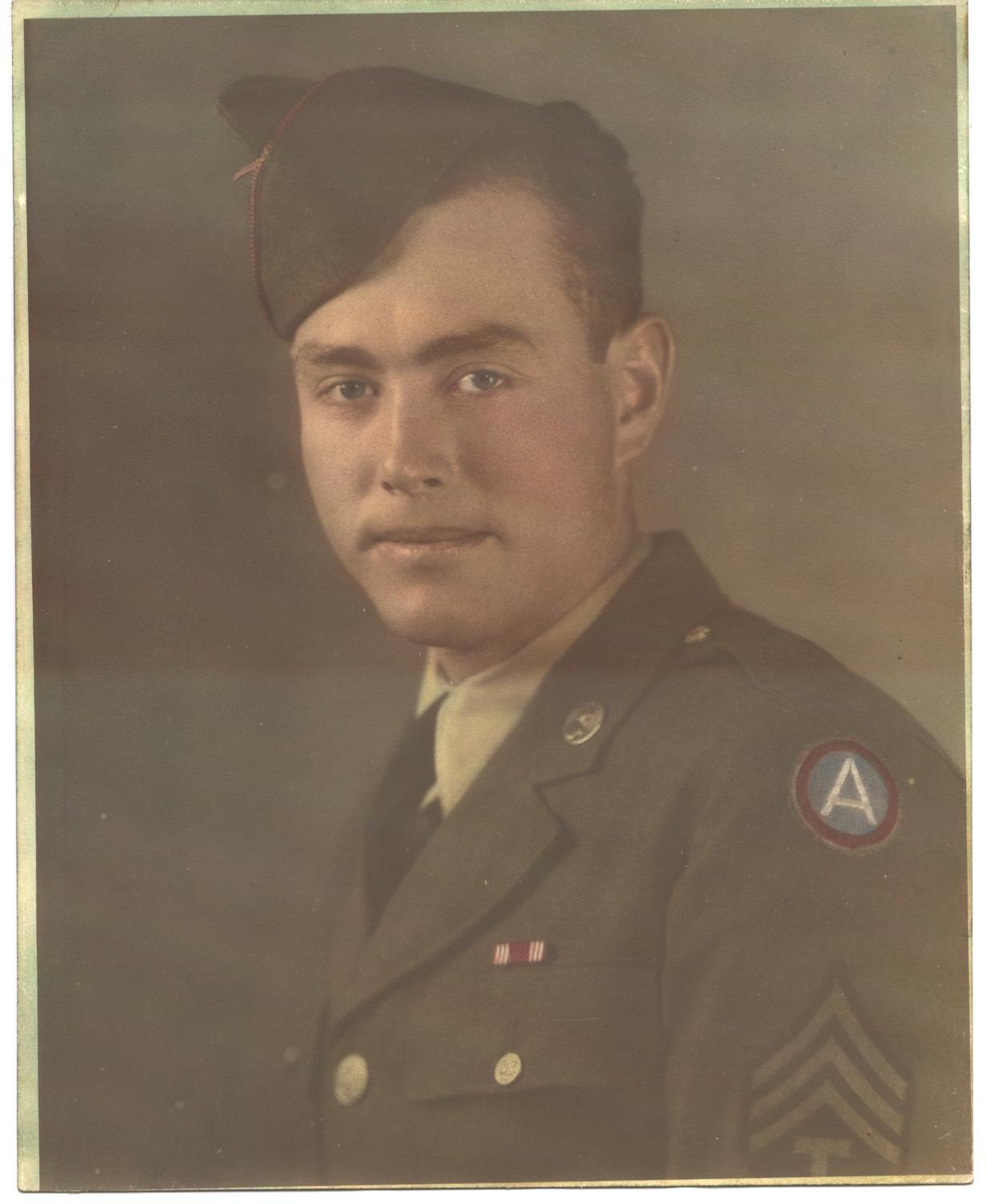TRANSCRIPTION
What did your parents do for a living?
They were farmers. They farmed cotton mostly, and some small grain. But daddy farmed sorghum for a while. He bought a sorghum mill and we'd farm that and make molasses.
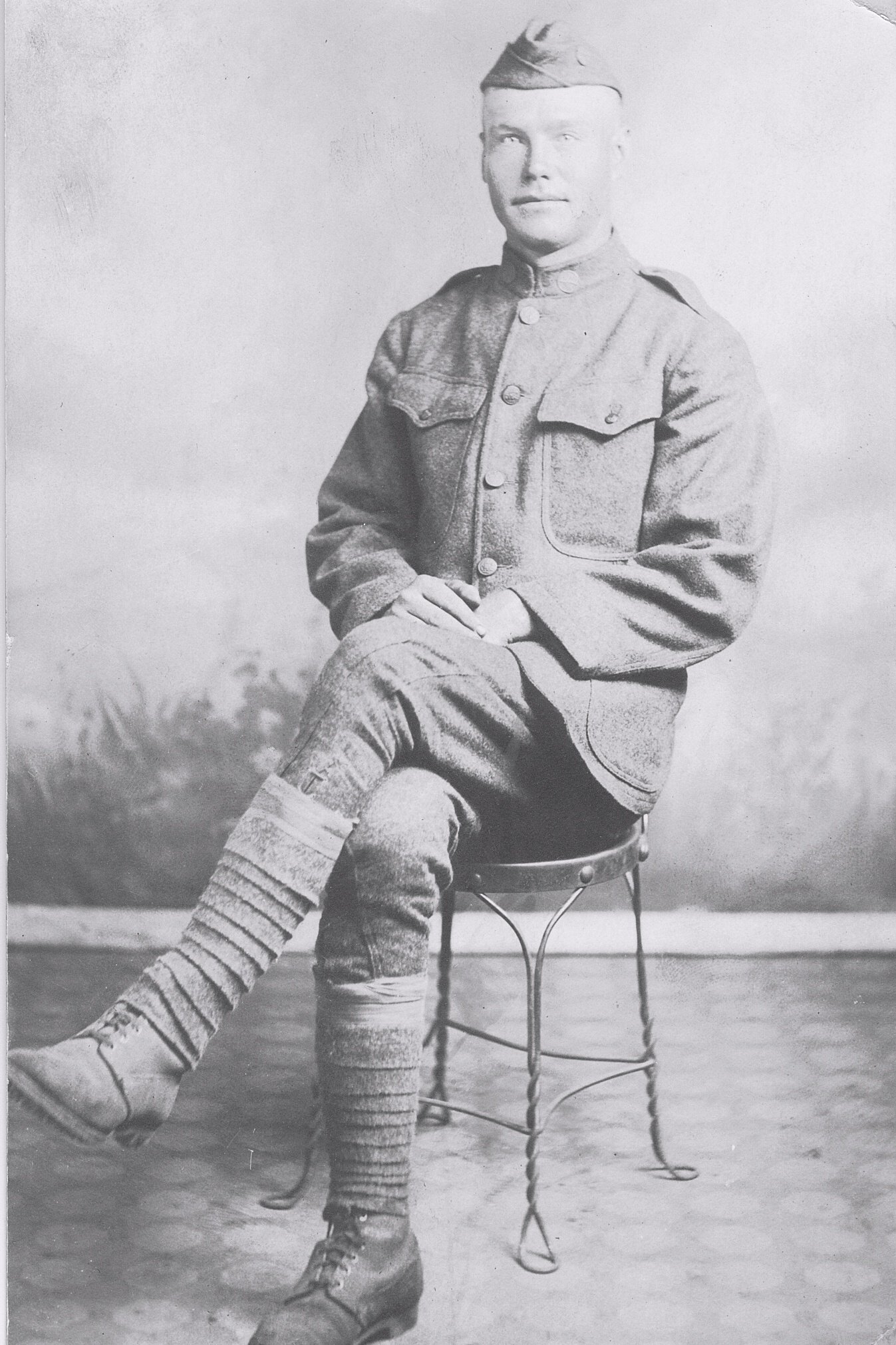
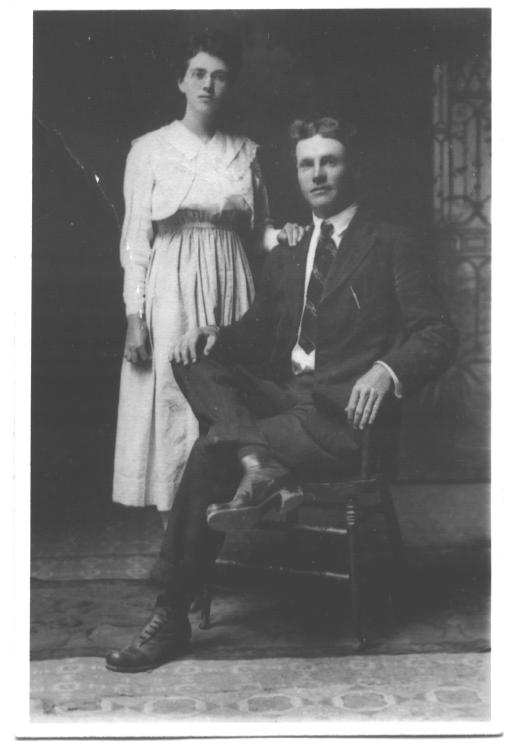
Where did you go to school?
First school I went to was named Hartford. Next was Barnum Springs. It was a huge school! It had two teachers! Then they consolidated with the schools from Post, and I went to Post High School. I stayed there until tenth grade, when I stopped going to help daddy farm the land when he got sick.
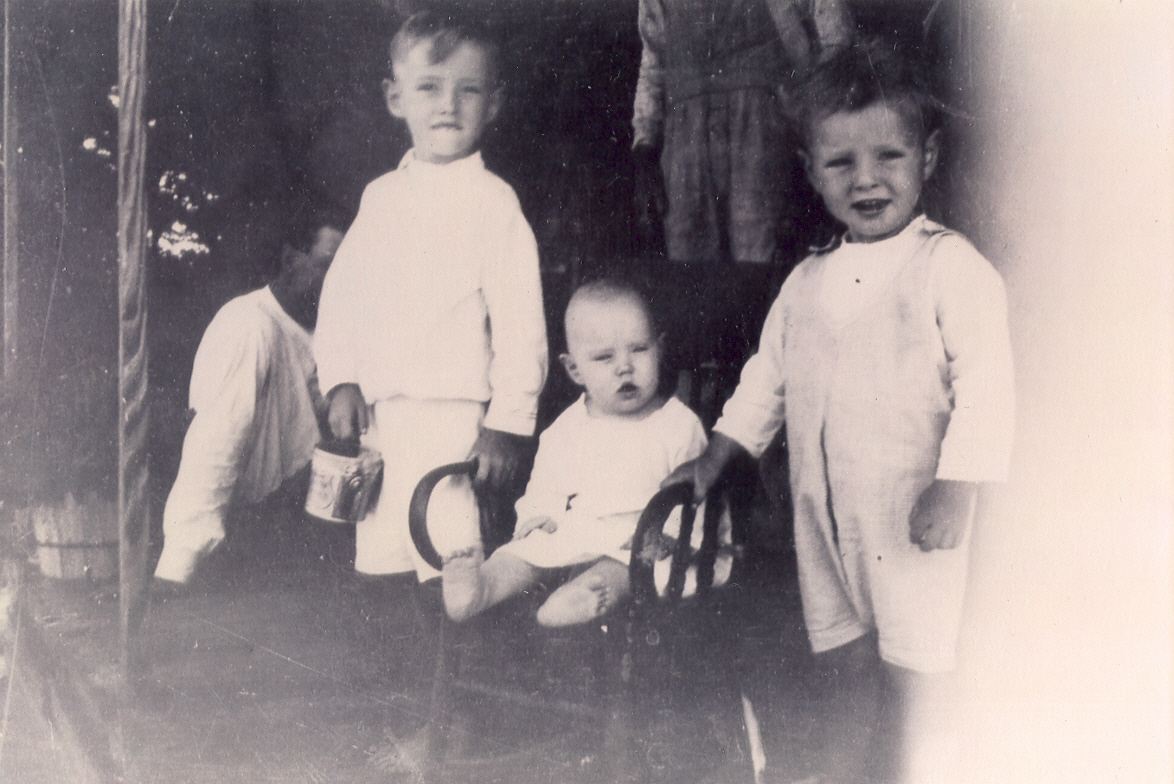

Did you work as a child on the farm? Did you get paid for it?
In 1932, the land we were living on had 400 acres and just daddy to do the cultivating, which was too much land for one man to cultivate with just horses. Now, if he had a tractor, he could have worked overtime and done it. But, that was when daddy made men out of Wayne and me! He put us out there right alongside of him to help him cultivate that land. Boy, we worked long hours! Daddy gave us each a pig for helping. Now that was a really big salary to us, because pigs were selling for five dollars each back then. That was for working all year long with him. Well they grew up to be hogs in no time. One of our neighbors came by the house and saw those two pigs and offered to trade on them with a saddle horse. So, we traded the man two hogs for a horse. Later on in the year, a neighbor had bought some Angora goats and needed help getting them in their pen. He told me and Wayne, I'll give you one of these goats if you'll help me get the rest of them back in the pen. So we worked half a day long, and finally got them all in. So he gave us a grown goat. We put him in with the horses, and he ate right along the side of them. He decided he was a horse and would go wherever they went. Well, the same man that we traded the pigs with saw the goat and asked if we wanted to trade. He wanted to butcher it, so he offered us ¼ of the meat, .50 cents, and a kid goat. So we traded, and he also gave Wayne the skin so he could make a rug out of it. Now, the next year, 1933, daddy gave me and Wayne a heifer calf for helping him. So we each had ½ a cow and ½ a horse. Well, I decided I didn't want a partnership cow or horse, so I traded Wayne my part of the horse for his part of the cow. So now I had a whole cow! Now in 1938, the blacksmith in Pleasant Valley offered to trade daddy a 1928 Chevrolet for a good milk cow. Daddy wasn't interested in trading, so I asked daddy if I could trade with the man. He agreed to it. So, I went and talked to the man and we traded. Now I have a 1928 Chevrolet. It was ten years old, but it was a beauty! It was kept in the garage the whole time they had it, so it looked brand new!
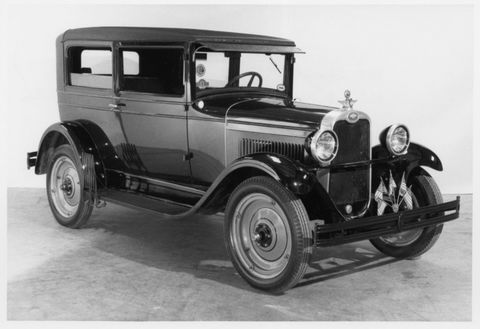
What did you do for fun as a child?
Well, we played dominoes, we had a checkerboard, and there was another game we played that momma remembered from her childhood. It was called fox & geese. You played it with buttons and a board kinda like a checkerboard. The geese were supposed to try to circle the fox. I know, some of our friends played with cards, but momma and daddy wouldn't allow that! Those cards were mean! They'd cause you to go wrong, gamble and such. I don't know how come they felt that way. We'd ride horses. The girls couldn't though. They wore dresses back then and riding a horse in a dress was a big "no-no" around our house. We also played ball, and kick the can. There was almost always some neighbors kids over at our house during the day.
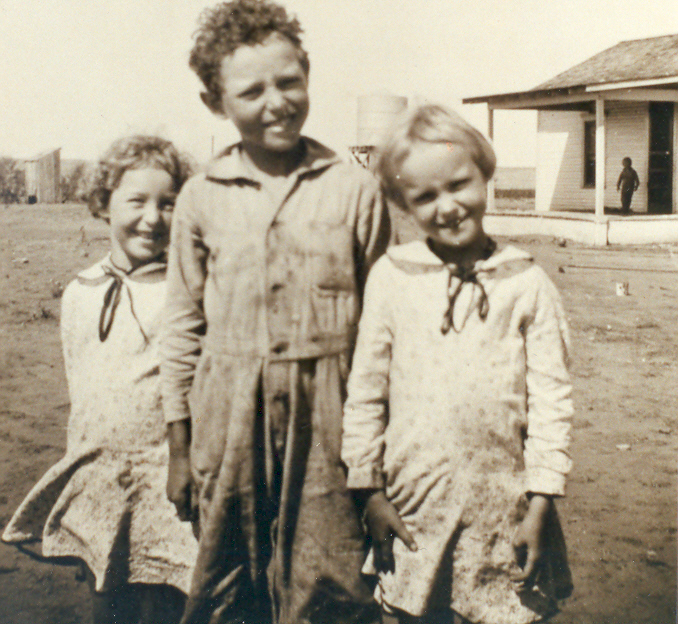
Did your community ever have neighborhood parties?
There was parties for the young people about one Saturday a month, somewhere in the neighborhood.
Did you have radios back then?
That was before the days of rural radio. I can remember when the radios came in to town. It was around '36 or '37. One of our neighbors got a radio. They had a son I chummed around with. He had a pretty sister too! I like to go over and visit him, but I mostly went over to see his sister and hear the radio! She never knew I liked her. I was real bashful back then!
What did your family do for transportation?
We had horses and a wagon. Daddy bought a car in about 1928, but he burnt the motor out as soon as he got it. He didn't buy another car until about 1944.
Where did you go when you were sick? What types of medicines did you use?
Back then, they didn't have anything such as tape or bandages. We just used white cloth or diapers and pinned them with a safety pin. Back then, in the community that year, every little scratch or nick you'd get would fester up. Well, Wayne had a big scrape on his leg from barb wire, and it just looked awful! Somebody told us, if you'll put carbolic acid on it, it will burn that infection out, and it will heal up. So he tried it. But, rather than getting a sponge or something to put it on there, he just poured it on there. It went all over in the back of his leg, and everywhere it went, he blistered up. Well, he had an awful time with that leg, but it eventually healed up. But he went to his grave with an awful scar on that leg. There was one doctor in the town of Post. For the whole county! But people didn't go to the doctor like they do now. They had to really need a doctor before they went. Momma had a specialty. For years, we would take Black Drought. It was a powdered leave or stem, and the awfullest stuff you ever tasted! She'd mix it with syrup and that seemed to make it worse! It'd stick to your lips and mouth, it was just awful stuff! Another thing later on that she started giving us was a patented medicine in a pill form called Talicab. And once in a while we'd take castor oil. We'd take that when we were what momma called "puny", just dragging and not feeling good. But, in the springtime, we had to take it whether we were sick or not to "clean" our bodies out from all the stuff we had in the winter. Boy it would clean you out!!!! Now when I was in the army, a good friend of mine talked me into faking sick to get out of passing review for the colonel in fort Riley, Kansas. So we went to the infirmary. Well, I hadn't thought about what I was gonna be sick with, so when the doctor asked me, I said "Well, I have a headache!" So, he knew I was faking, he wrote something down, and said "Give it to the man in the window," so the man in the window took out a 8 oz glass, poured 2/3 of it full of castor oil, and said "drink it!!!" Now a spoonful of it was all I ever took at a time, no telling what a cupful would do to me! Well I drank it, for fear of being put in front of the firing squad if I didn't. It was awful! If I wasn't sick before, I sure was now!! And the next day, I was really sick! My buddy had it all thought out before he got there, though. He just wanted his teeth checked! That's what I used from then on.
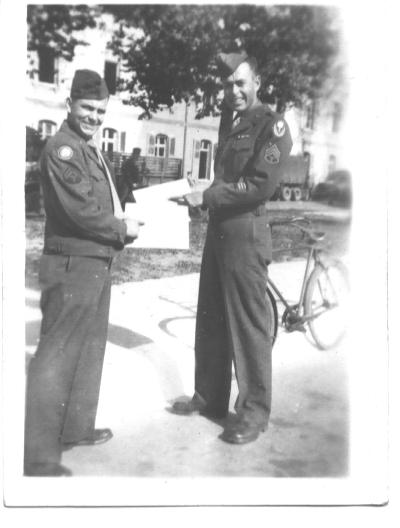 How did you keep time? Did you follow a schedule?
How did you keep time? Did you follow a schedule?
Daddy, I know lots of time would look up at the sun and say, It's about 2:30 or 3:00. Or he'd look at the shadow of the horse and say "it's almost 5:00." And that's the way everybody done it back then, they'd just use the sun. But I don't remember anybody ever having a timepiece out there. Of course, everybody had a clock at the house, but that's all. We relied on the sun most of the time. Daddy, all his life, got everybody up at 5:00. Didn't matter whether you're working, playing, or nothing. Momma usually had dinner ready almost always at about 12:00.
Was there any type of government aide around where you lived?
I guess there was. I didn't know of any. They had, I know, the WPA, Works Progress Administration. The men could sign up and work on the roads and stuff. Daddy was on that for two weeks and wouldn't go back. He said "I'm an able bodied man, these people just piddle around and don't do nothing." They had WPA rations, and we got that one time. He said "I'm ashamed to receive that kind of help. I'm able to work. I can't feel good about getting help like that." Well, we did fine on our own. We shot rabbits with a slingshot nearly every day and ate 'em.
What did you buy when you went to the store?
We had to buy flour, coffee, salt, sugar, baking powders, stuff like that. We used a lot of corn meal. Well, we grew corn, so we would shell corn, and take it to the mill to get it ground up for corn meal. We ate a lot of cornbread. But, you just got to learn what you can and can't do with what you've got readily available. We had eggs, meat, and vegetables. We'd have bacon when we killed a hog. We had to kill animals in cold weather so they would cure out. We didn't have an icebox, so it was cured or canned.
Where did your family buy clothes?
Momma had a Sears catalog. I can't remember ever buying any of our clothes from town. They'd come from Sears. Wasn't often, though. She had to pay for it right when she got it, because Sears didn't have a credit plan back then. We had one new pair of shoes a year, and that was when school started. They were for cold weather. When warm weather'd come, we pulled those shoes off and went barefooted. We didn't ever have shoes to wear in the summertime at all! We wore a lot of patched clothes. Momma would patch them up, and then patch the patches when they wore through.
Why did you decide to go into the military?
I didn't decide anything! The government decided for me. I got drafted in 1941. All my brothers besides Vernon got drafted! When you become 21, you have to register. I registered in December, and they called me on July 17. I went to Camp Chaffee in Arkansas. I also went to Atlanta, Georgia for training as a mechanic. I was in the army during World War II. They sent me to England, and then to the invasion of France, where I stayed until I was sent to Frankfurt, Germany, where I stayed until the end of the war. I was in the army for 3 years, 3 months, and 27 days.
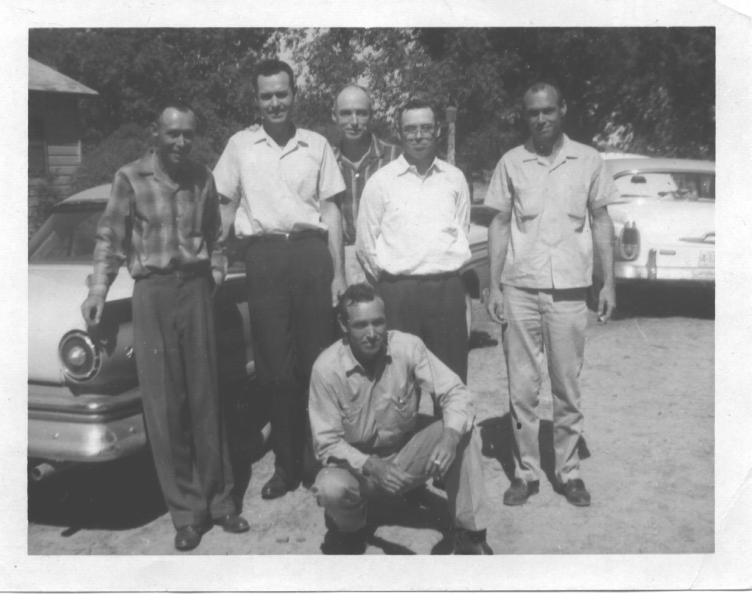
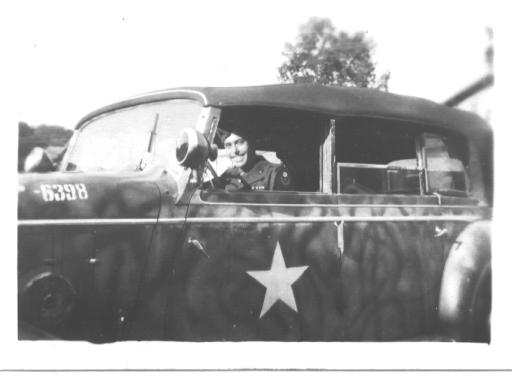 Where did you meet your wife?
Where did you meet your wife?
I met Geraldine in Fort Smith at church. She was living with her sister up there. I met her before I went overseas. I got back and married her just as soon as I could! We were married on December 9, 1945. We had three sons: Louis, Daymon, and Dennis.
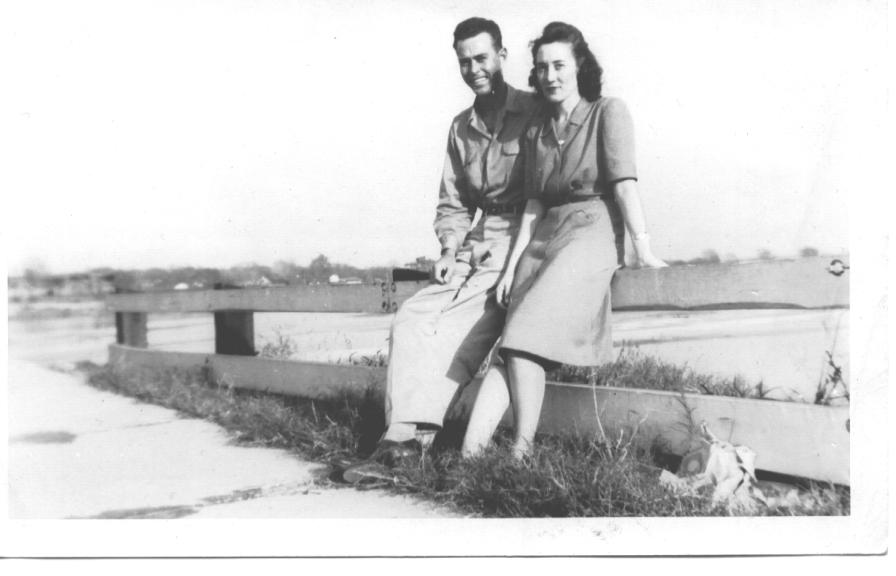 Is there anything Else you'd like to add about the great depression?
Is there anything Else you'd like to add about the great depression?
Well, lots of people went hungry! We lived near the railroad. There was a switch about a ½ mile from us. We'd get a lot of what we'd call "tramps" or "drifters". They'd want something to eat. Well, momma at first fed a lot of them, until she started telling them, I'll cook for you if you go out there and get me some wood. And not a one of them would do it! They'd just go to the next house and try their luck there. Momma and Daddy did the best they could with what they had. With the size of the family they had - nine kids- we got by pretty good. We didn't ever go hungry. The depression, someone would just have to go through it to understand what it was like.
ANALYSIS
There are so many things that my Uncle William talked about that I never would have even imagined I would hear about. Not only did I learn a lot about the Great Depression, the Dustbowl, and World War II, but I also learned so much about my family history. I never knew my grandmother played on a basketball team, graduated high school, and was a teacher before she married my grandpa. I learned what my aunts, uncles, and my father went through growing up in early 20th century West Texas. This was a very emotional experience for me, and I believe it was for my uncle William as well. One of the most touching things I learned about happened on the drive to the airport with my uncle. I asked him what his fondest memories of his father were. He said that there was a song his daddy sang when he was young about birds in a pie. I knew exactly what song he was talking about because my daddy sang that song to me as a child! So I sang it to him and we were both quiet for awhile, missing our fathers who have been gone for so long. This is a wonderful and effective way to learn as well as teach history, and I will not stop at this interview. I would like to thank my Uncle William for inviting me into his home and sharing all these wonderful stories with me.
TIMELINE
- Dec 20, 1920 William Dennis Nipp was born in Morgan Mill, Texas
- 1927 Nipp family moved to Post, Texas
- 1932 William begins to work on the family farm
- 1936 William quits school to work on the farm full time
- 1937 William trades a cow for his first car
- Dec 1941 William registers for the WWII draft
- July 17, 1942 William enlists in the US Army
- Nov 1945 William returns to the US after three years at war
- Dec 9 1945 William marries Geraldine Gross
- Mar 19, 2007 Interview of William Nipp by Tanya Nipp
ANNOTATED BIBLIOGRAPHY
Hunt, William R. "MORGAN MILL, TEXAS." The Handbook of Texas Online. Texas State Historical Association, 18 Jan. 2008. Web. 19 Mar. 2007. The Handbook of Texas Online
is a multidisciplinary encyclopedia of Texas history, geography, and culture sponsored by the
Texas State Historical Association and the General Libraries at UT-Austin. It was produced
in partnership with the College of Liberal Arts and the General Libraries at the University of
Texas at Austin. Copyright © The Texas State Historical Association. Last Updated: May 6, 2004.
Wiggins, Noel. "SNYDER, TEXAS." The Handbook of Texas Online. Texas State Historical Association, 18 Jan. 2008. Web. 19 Mar. 2007. The Handbook of Texas Online
is a multidisciplinary encyclopedia of Texas history, geography, and culture sponsored by the
Texas State Historical Association and the General Libraries at UT-Austin. It was produced
in partnership with the College of Liberal Arts and the General Libraries at the University of
Texas at Austin. Copyright © The Texas State Historical Association. Last Updated: May 6, 2004.
Lucko, Paul. "POST, TEXAS." The Handbook of Texas Online. Texas State Historical Association, 18 Jan. 2008. Web. 19 Mar. 2007. The Handbook of Texas Online
is a multidisciplinary encyclopedia of Texas history, geography, and culture sponsored by the
Texas State Historical Association and the General Libraries at UT-Austin. It was produced
in partnership with the College of Liberal Arts and the General Libraries at the University of
Texas at Austin. Copyright © The Texas State Historical Association. Last Updated: May 6, 2004.
"Fort Chaffee." Global Security.org, 21 Jan. 2006. Web. 19 Mar. 2007. Camp Chaffee in Arkansas. GlobalSecurity.org is the leading source of background information and developing news stories in the fields of defense, space, intelligence, WMD, and homeland security. Launched in 2000, GlobalSecurity.org is the most comprehensive and authoritative online destination for those in need of both reliable background information and breaking news. GlobalSecurity.org, is well-respected, trusted and often-referenced in the media, both domestically and internationally.
Christison, Ken, and Keith Kinney. "The art of making Sweet Sorghum." The Kinney family. Web. 19 Mar. 2007.
This site is dedicated to preserving the art of making sorghum molasses.
